Philips Hue Lily Outdoor Spotlight vs Chiron Solar Spotlight: which is best?
Both of these outdoor spots provide colourful highlights to garden borders, but which one is up your garden path?

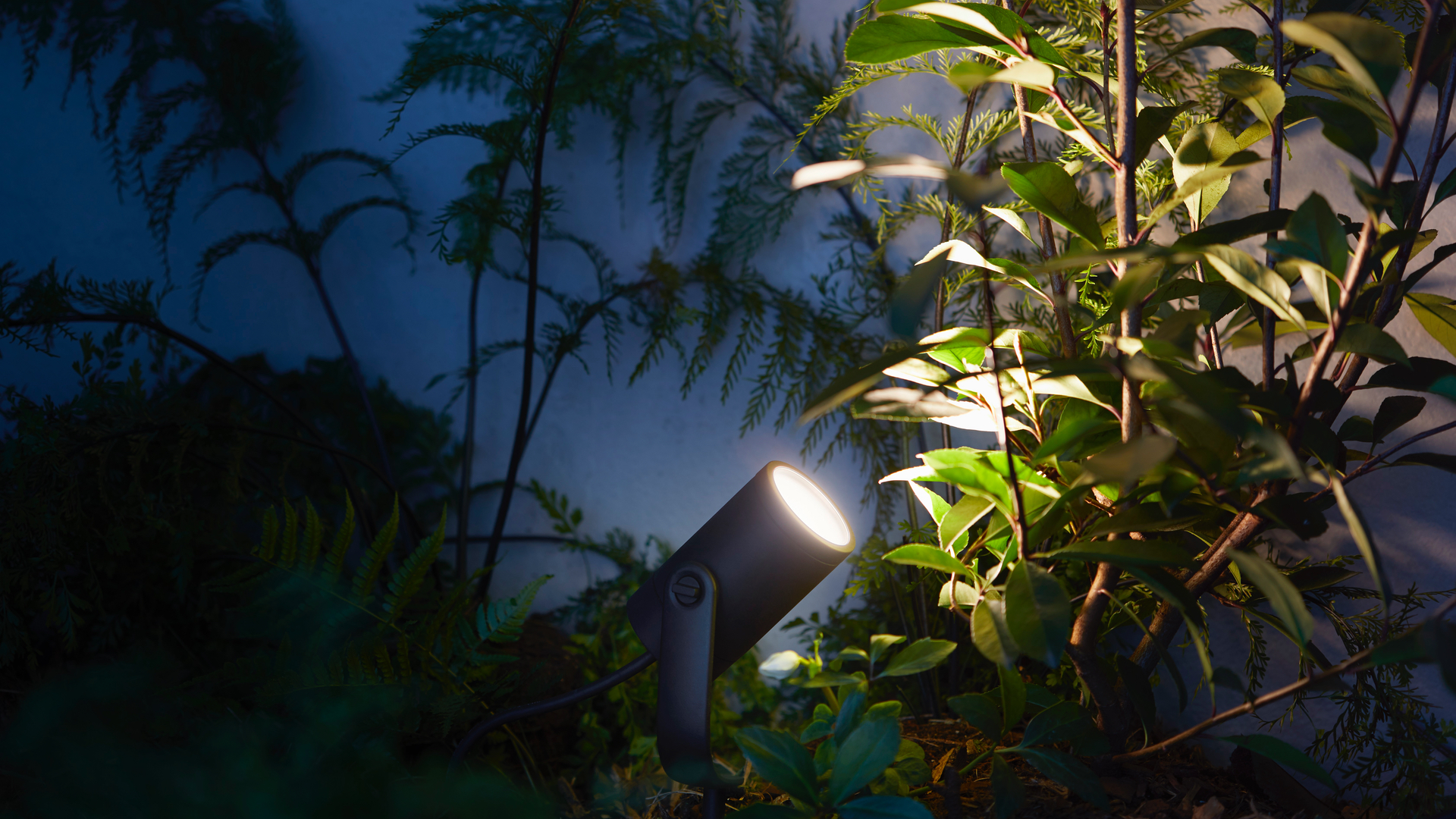
When it comes to lighting up the great outdoors with the best outdoor lights, the choice is almost limitless. There’s wall-mounted lighting for the patio and verandah, decking lights, automatic PIR security lights for the passageway and garage, string lights for decorating the summer cabin, strip lights, stake lights, up lights, down lights, Tiki flame lamps, the list goes on.
However, for this writer’s money, nothing beats the good old spot light. These lights aren’t great for entertaining because they’ll just dazzle the guests, but they are unbeatable when it comes to highlighting the natural beauty of a garden. Whether it’s illuminating a prized Acer Palmatum, a grove of fruit trees in full blossom, a bevy of rose bushes or a tall and slender silver birch, spotlights add amazing ambience to the garden once the sun’s gone to bed.
Today we’re running a comparison between two colourful solo spots – the Hue Lily Outdoor Spotlight and Chiron Solar Spotlight. Both of these models excel at bringing out the best in a garden after dark but one is easier to set up and better value for money while the other is much more feature filled and controllable from the comfort of an armchair.
Philips Hue Lily Outdoor Spotlight vs Chiron Solar Spotlight: design and features
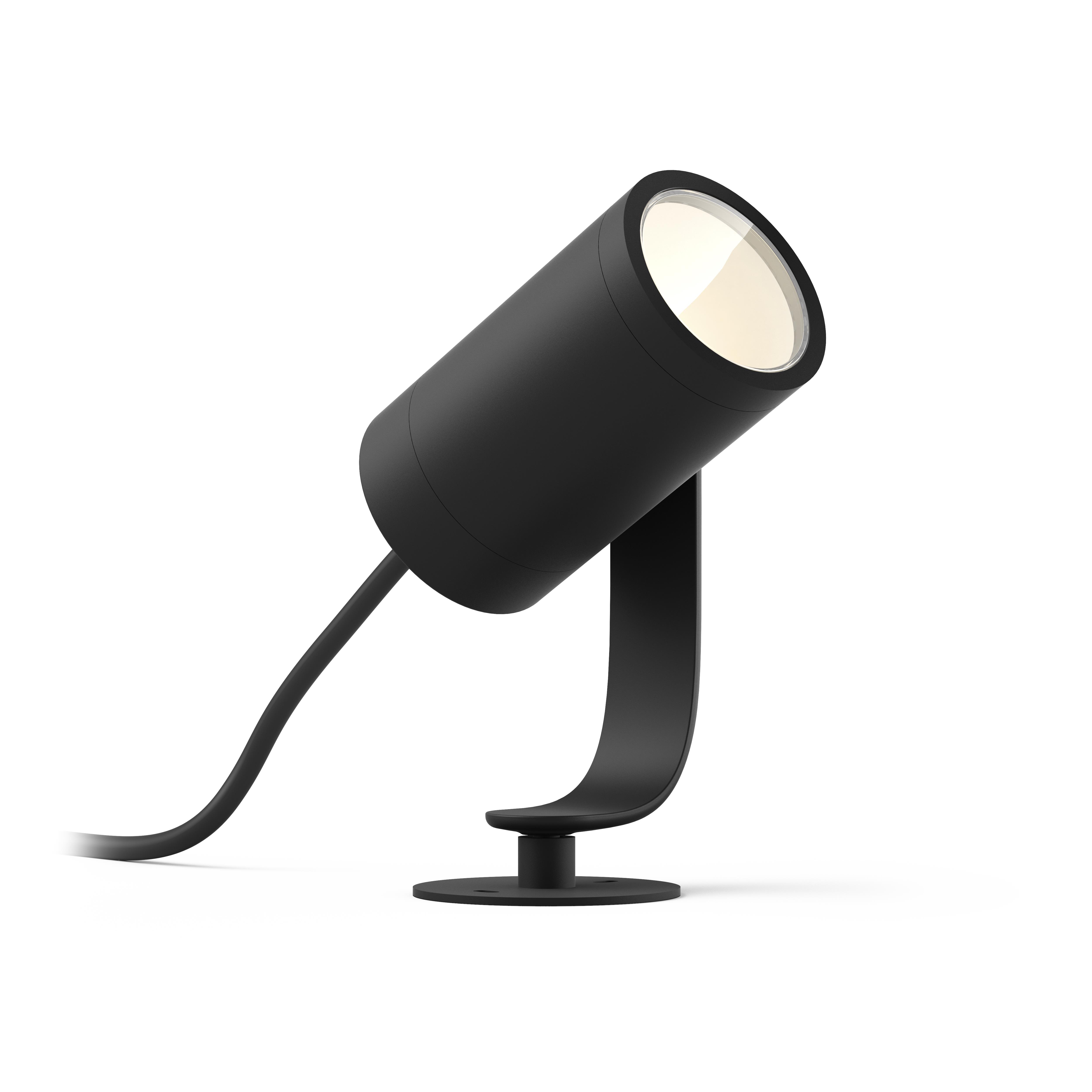
The low-voltage Philips Hue Lily Outdoor Spotlight isn't cheap but then it does display millions of colours and can be controlled with an app
The single most important difference between the Lily and the Chiron is the way they’re powered. The Lily is IP65 rated for water resistance and runs on 24-volt mains power so it will require an outdoor mains socket to work. You will also need to bury or carefully hide the supplied 5m of cable and preferably keep the 24-volt power supply off the ground. By stark contrast, the equally waterproof Chiron has its own power source in the form of a small 14cm x 9cm solar panel attached just behind the spotlight housing. With this model you simply stick it in the ground and angle the panel towards the sun. Job done.
Anyone who has ever owned a set of Hue lights will know how amazing they are. However, all Hue lights require a Hue Bridge to function correctly and they cost £50 a pop. If you already have a Hue system in the home, you can simply link the Lily to your Bridge but the spot will have to be positioned within range of the wi-fi signal or you won’t be able to control it from the Hue app. And speaking of control, the Lily can cycle through every conceivable colour and shade in the spectrum (about 16 million colours according to Philips). You can select a single colour and adjust its brightness or have the spot smoothly transition from one colour to another. You can even control everything while away from home.
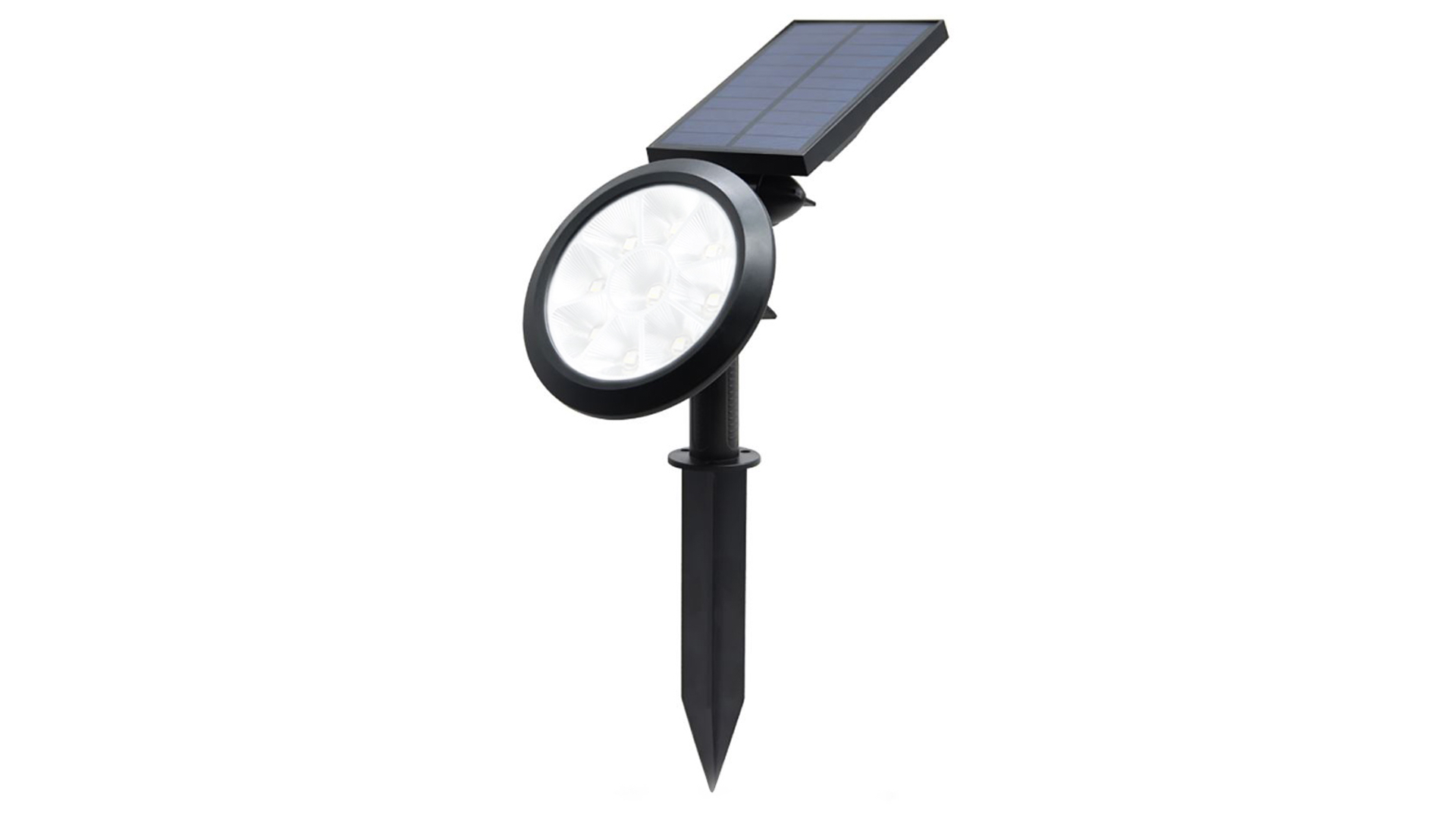
The Chiron Solar Colour Spotlight requires no special installation. Simply stick it in the ground
The Chiron has no such luxuries. Choosing a specific colour with this spot involves crouching down in the dead of night, pressing a rubberised button and waiting as it sequences through all seven colours – red, blue, green, yellow, light blue, pink and white. Once your preferred colour arrives, press the button again and it will stay that colour every time the light switches on. Alternatively, you can just let it scroll from one colour to the next. However, be warned that the Chiron doesn’t transition between colours with anything like the smoothness of the Hue Lily. Instead, it simply switches from one colour to the next in pretty quick succession.
Regarding build quality, the Hue Lily is properly robust and made from high-quality painted metals. The Chiron, by contrast, is almost entirely plastic, but tough plastic nonetheless.
Get all the latest news, reviews, deals and buying guides on gorgeous tech, home and active products from the T3 experts
Philips Hue Lily Outdoor Spotlight vs Chiron Solar Spotlight: performance
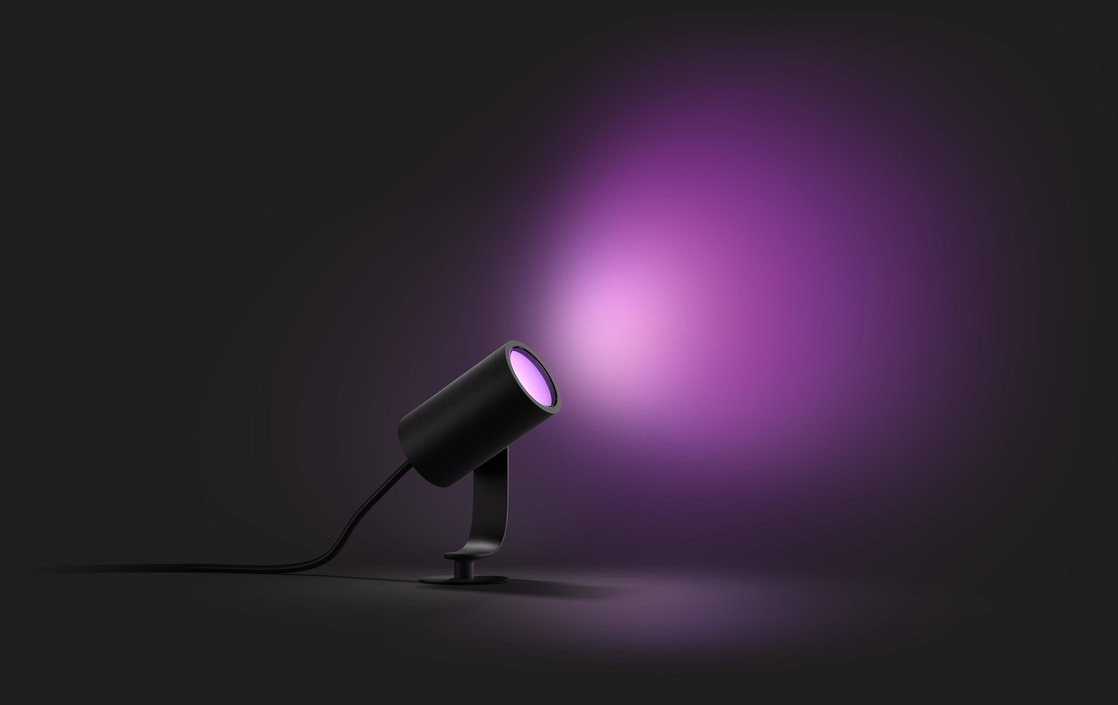
The 24-volt Hue Lily can be DIY installed but you will need a nearby mains socket
The solar-powered Chiron has its own battery which powers the light once the sun's gone down. It is also equipped with a light sensitive sensor that switches the spot on automatically when it gets dark while the Hue Lily requires setting a time on the app. The Hue Lily will go on burning right through to sunrise but the Chiron’s on-board battery will start to wane after about eight hours – and that's excellent for a solar light.
From a brightness point of view, the Chiron kicks out about 50 lumens against the Hue Lily’s 200 lumens. However, the Lily’s light is much more diffuse than the Chiron – think of it as more of an accent light for creating a subtle atmosphere. While theoretically less bright, the Chiron’s illumination range turned out to be much greater than the Lily’s. For instance, where the Lily’s soft white colour managed to illuminate the lower branches of a 70-foot silver birch, the Chiron’s beam went way beyond to nearly half the height of the tree. Granted, the Chiron’s white setting is on the cool side (ie quite harsh like a security spot) but I found switching it to yellow softened the tone considerably – and that’s the colour I’ve settled on.
Philips Hue Lily Outdoor Spotlight vs Chiron Solar Spotlight: verdict
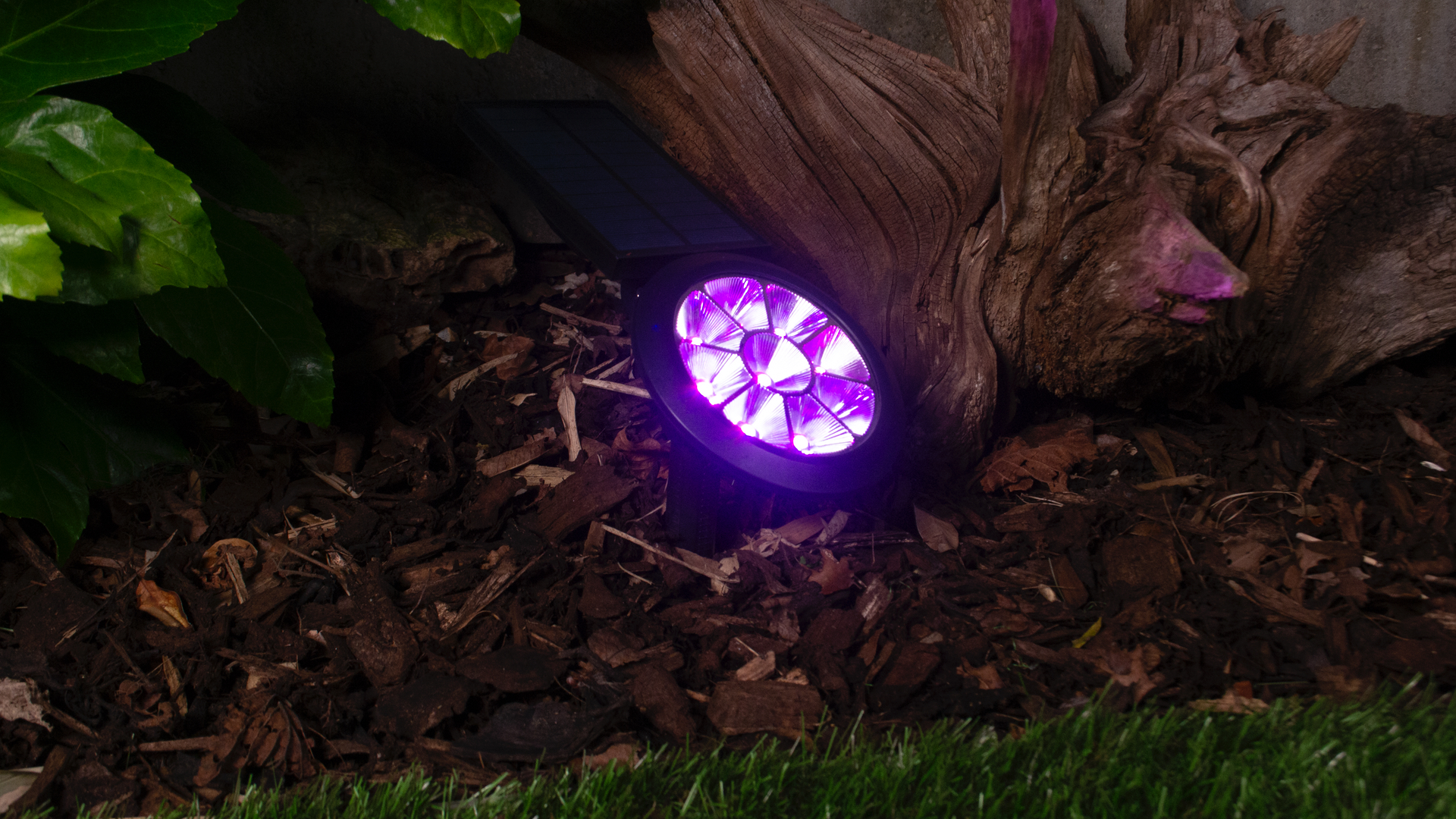
The solar-powered Chiron Solar Spotlight comes with seven different colour settings
The Hue Lily costs a penny under £80 (plus a one-off £50 for the internet Bridge if you haven't already got one) while the Chiron comes in at a shade under £30, which means you could almost buy three Chirons for the price of one Lily. Also, the Chiron doesn’t require any setting up whatsoever though its performance is ultimately reliant on receiving a good dose of sunshine during the day.
Despite all the colour options with both light systems, I found that soft white on the Lily and yellow on the Chiron produced the most effective ambience. The greens are worth trying, too, but some of the other colours can tend to make the garden look like Disneyland.
So which one’s best? Well, if money is part of the equation then the Chiron Solar Spotlight passes much muster – it’s simple to instal and generally brighter. But if you want full control from the patio lounger and actually enjoy having the shrubs and trees at night gently transition from one lush colour to another, the Hue Lily Outdoor Spotlight is an excellent choice.
Derek (aka Delbert, Delvis, Delphinium, Delboy etc) specialises in home and outdoor wares, from coffee machines, white appliances and vacs to drones, garden gear and BBQs. He has been writing for more years than anyone can remember, starting at the legendary Time Out magazine – the original, London version – on a typewriter! He now writes for T3 between playing drums with his bandmates in Red Box (redboxmusic).
